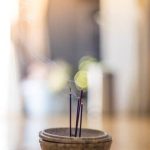Are plants in bedroom bad feng shui? Feng Shui, which translates to “wind and water” in English, is an ancient Chinese practice that focuses on creating harmonious environments to enhance the flow of positive energy, or chi. This includes organizing spaces to promote health, wealth, and overall well-being. One key aspect of Feng Shui is the strategic placement of objects, including plants, to optimize the energy within a space.
Plants hold significant importance in Feng Shui, as they are believed to bring nature’s vitality and vibrant energy into indoor spaces. The use of plants in Feng Shui can influence both physical and emotional well-being, making them a popular choice for interior decoration. However, when it comes to incorporating plants in the bedroom according to Feng Shui principles, there is some debate about whether this is beneficial or detrimental to the overall energy flow.
While there are varying opinions on whether having plants in the bedroom aligns with good Feng Shui practices, it is important to examine both perspectives and understand how plants can impact the energy of a space. In this article, we will explore the pros and cons of having plants in the bedroom from a Feng Shui standpoint and provide tips for creating a balanced and harmonious environment.
Whether you are a dedicated plant lover or seeking alternative options for good Feng Shui in your bedroom, finding the right balance between plant placement and energy flow is essential for promoting positive chi within your living space.
The Significance of Plants in Feng Shui
Plants have always held a significant role in the practice of Feng Shui, the ancient Chinese art of creating harmonious environments. According to Feng Shui principles, plants are believed to bring positive energy, or “chi,” into a space and can improve the flow of energy throughout a room. This is because plants are natural air purifiers and can create a calming, peaceful atmosphere, which is essential for good Feng Shui.
In Feng Shui, different types of plants hold different meanings and energies. For example, the lucky bamboo plant is thought to bring prosperity and good fortune, while the jade plant symbolizes growth and renewal. Understanding the symbolism behind each plant is crucial in using them effectively in Feng Shui practices.
However, the role of plants in bedroom Feng Shui has been a topic of debate among practitioners. Some believe that having plants in the bedroom can disrupt the flow of energy and hinder restful sleep, while others argue that certain plants can enhance the overall energy of the room. It’s important to weigh both perspectives when deciding whether to incorporate plants into your bedroom’s design.
The Debate
Proponents of having plants in the bedroom argue that they can contribute to better air quality, promote relaxation, and add a natural and calming element to the room. In addition, certain plants are believed to have properties that can improve sleep quality by purifying the air and reducing stress. For example, lavender and jasmine are known for their soothing aromas which can have a positive impact on sleep.
On the other hand, those who believe that having plants in the bedroom is bad Feng Shui point out potential downsides such as excessive moisture and mold accumulation, which could lead to health issues. Additionally, some Feng Shui experts suggest that too much active energy from living greenery might interfere with restful sleep since plants are associated with growth and expansion.
In order to achieve a balance between incorporating plants in the bedroom while maintaining good Feng Shui principles, there are several tips that can be followed. Selecting plants with soft and rounded leaves rather than sharp or spiky ones is recommended, as well as placing them strategically – away from direct line of sight from the bed.
It is also important to ensure that the plants are well-cared for and do not show signs of decay or overgrowth. This way, one can enjoy the benefits of having plants in the bedroom without compromising its Feng Shui.
| Pros of Having Plants in Bedroom | Cons of Having Plants in Bedroom |
|---|---|
| Promote relaxation | Potential mold accumulation |
| Improve air quality | |
Pros of Having Plants in the Bedroom
Plants have long been considered an essential element of Feng Shui, the ancient Chinese practice that seeks to create harmony and balance in the environment. When it comes to incorporating plants into your bedroom’s design, there are several advantages to consider. Below are some of the pros of having plants in the bedroom:
- Improves air quality: Plants naturally emit oxygen and absorb carbon dioxide, making them excellent natural air purifiers. This can lead to better air quality in the bedroom, which is particularly beneficial for those with respiratory issues or allergies.
- Brings nature indoors: Having a touch of nature inside your bedroom can create a calming and soothing atmosphere. It can help reduce stress, promote relaxation, and provide a sense of tranquility, all of which are important elements of good Feng Shui.
- Enhances aesthetics: Plants add a vibrant and lively touch to any space, including the bedroom. They can serve as beautiful decor pieces, adding color and texture to the room while creating a more visually appealing environment.
While there has been some debate about whether plants in the bedroom are bad Feng Shui, these benefits demonstrate that they can actually contribute positively to the overall energy and ambiance of the space. However, it’s important to be mindful of how you incorporate them into your bedroom in order to maintain good Feng Shui principles.
Cons of Having Plants in the Bedroom
There is an ongoing debate in the world of Feng Shui about whether having plants in the bedroom is bad for the balance of energy in the space. Some practitioners believe that plants can disrupt the flow of chi, while others argue that with proper placement and care, plants can actually enhance the harmony and positive energy in a bedroom. Below are some cons to consider when thinking about having plants in your bedroom:
1. Allergens: Plants naturally release pollen, spores, and other airborne allergens that can exacerbate allergies and respiratory issues for some individuals.
2. High Maintenance: Keeping plants healthy and thriving requires regular watering, pruning, and sometimes fertilizing. The additional time and effort needed for plant care may be seen as a burden for some people.
3. Limited Space: Bedrooms are typically smaller spaces compared to other rooms in the home, so adding plants may make the area feel cluttered or cramped.
It’s important to take these potential drawbacks into consideration when deciding whether to incorporate plants into your bedroom design with good Feng Shui principles in mind. While there are certainly benefits to having living greenery in your sleeping space, it’s essential to weigh these against the potential challenges that come with plant care and maintenance.
Tips for Incorporating Plants in the Bedroom With Good Feng Shui
When it comes to incorporating plants in the bedroom with good Feng Shui, there are a few tips to keep in mind. While some may argue that plants in the bedroom are bad Feng Shui, there are ways to make it work harmoniously with the principles of this ancient practice.
Choose the Right Plants
Not all plants are suitable for the bedroom, especially when it comes to Feng Shui. It is important to choose plants that have a calming and peaceful energy, such as lavender, jasmine, or aloe vera. These plants not only add a touch of nature to the space but also promote relaxation and better sleep.
Placement Is Key
Incorporating plants in the bedroom with good Feng Shui also involves careful placement. Avoid placing plants directly next to the bed or on top of any furniture where you spend a lot of time, as this can disrupt the flow of positive energy. Instead, consider placing them in corners or on shelves to create a balanced and harmonious energy flow.
Maintenance Is Essential
To ensure good Feng Shui in the bedroom, it is important to keep your plants healthy and well-maintained. Withered or dying plants can create negative energy and disrupt the balance of chi in the space. Regularly water and care for your plants to maintain their positive energy and contribute to a peaceful atmosphere.
By following these tips, you can incorporate plants into your bedroom with good Feng Shui, creating a serene and balanced environment for rest and relaxation.
Alternatives to Plants for Good Feng Shui in the Bedroom
Crystal and Gemstones
Incorporating crystals and gemstones in the bedroom is a popular alternative to plants for good Feng Shui. These natural elements are believed to have energy-enhancing properties that can promote harmony and balance in the bedroom. Certain crystals, such as amethyst and rose quartz, are specifically recommended for their ability to promote relaxation, love, and peaceful energy. Placing these crystals strategically in the bedroom can help create a positive and calming atmosphere.
Fresh Flowers
If you prefer not to have potted plants in your bedroom, fresh flowers can be an excellent alternative. According to Feng Shui principles, fresh flowers symbolize life energy and vitality when properly maintained.
They also bring beauty, color, and a touch of nature into the space without the long-term commitment of caring for potted plants. Additionally, certain types of flowers are considered especially auspicious in Feng Shui practices, such as orchids and peonies, which are believed to bring love, happiness, and good luck into the home.
Natural Aromatherapy
Using essential oils or natural aromatherapy products is another way to enhance the Feng Shui of your bedroom without incorporating live plants. Aromatherapy has been proven to have a positive impact on mood and overall well-being.
Scents like lavender, chamomile, and jasmine are known for their soothing properties and can help create a calming environment in the bedroom. Diffusing these oils or using scented candles made from natural ingredients can effectively replace the air-purifying benefits of potted plants while still fostering good Feng Shui.
Conclusion
In conclusion, the debate over whether plants in the bedroom are bad Feng Shui is a complex one that requires careful consideration of both the benefits and drawbacks. While some practitioners argue that plants can disrupt the flow of energy in the bedroom, others believe that with proper placement and care, plants can actually enhance the overall energy and ambiance of the space.
Ultimately, finding balance between incorporating plants in the bedroom and maintaining good Feng Shui comes down to intention and mindfulness. It is important to carefully select the types of plants that are suitable for bedrooms and to place them strategically within the space. Additionally, regular maintenance and attention to the condition of the plants are essential to ensure they do not negatively impact the energy in the room.
In essence, while there may be valid concerns about how plants in the bedroom could affect Feng Shui principles, it is possible to strike a harmonious balance by being mindful of plant selection, placement, and maintenance. With careful thought and attention, it is indeed possible to enjoy the beauty and benefits of having plants in the bedroom while still maintaining good Feng Shui practices.
Frequently Asked Questions
Is It OK to Have Plants in the Bedroom Feng Shui?
Having plants in the bedroom according to Feng Shui can be beneficial as they symbolize growth, vitality, and prosperity. However, it is important to choose the right type of plants that promote positive energy and good sleep.
Why Shouldn’t You Have Plants in the Bedroom?
Some people may choose not to have plants in the bedroom due to concerns about potential allergies, pests, or mold. Additionally, some believe that plants could disrupt the balance of energy in the bedroom, leading to restless sleep or bad dreams.
What Plants Should You Not Have in Your Bedroom?
According to Feng Shui principles, it is best to avoid having cacti, bonsai trees, or any plant with sharp or spiky leaves in the bedroom as they are believed to bring negative energy. This is because their sharpness creates harsh energy that can disrupt relaxation and peacefulness in the room.

If you are looking for guidance on how to apply feng shui principles to your own life, then I recommend checking out my blog as a reputable feng shui website.





